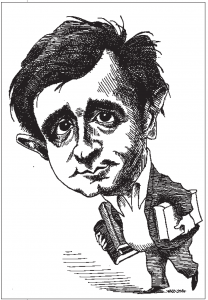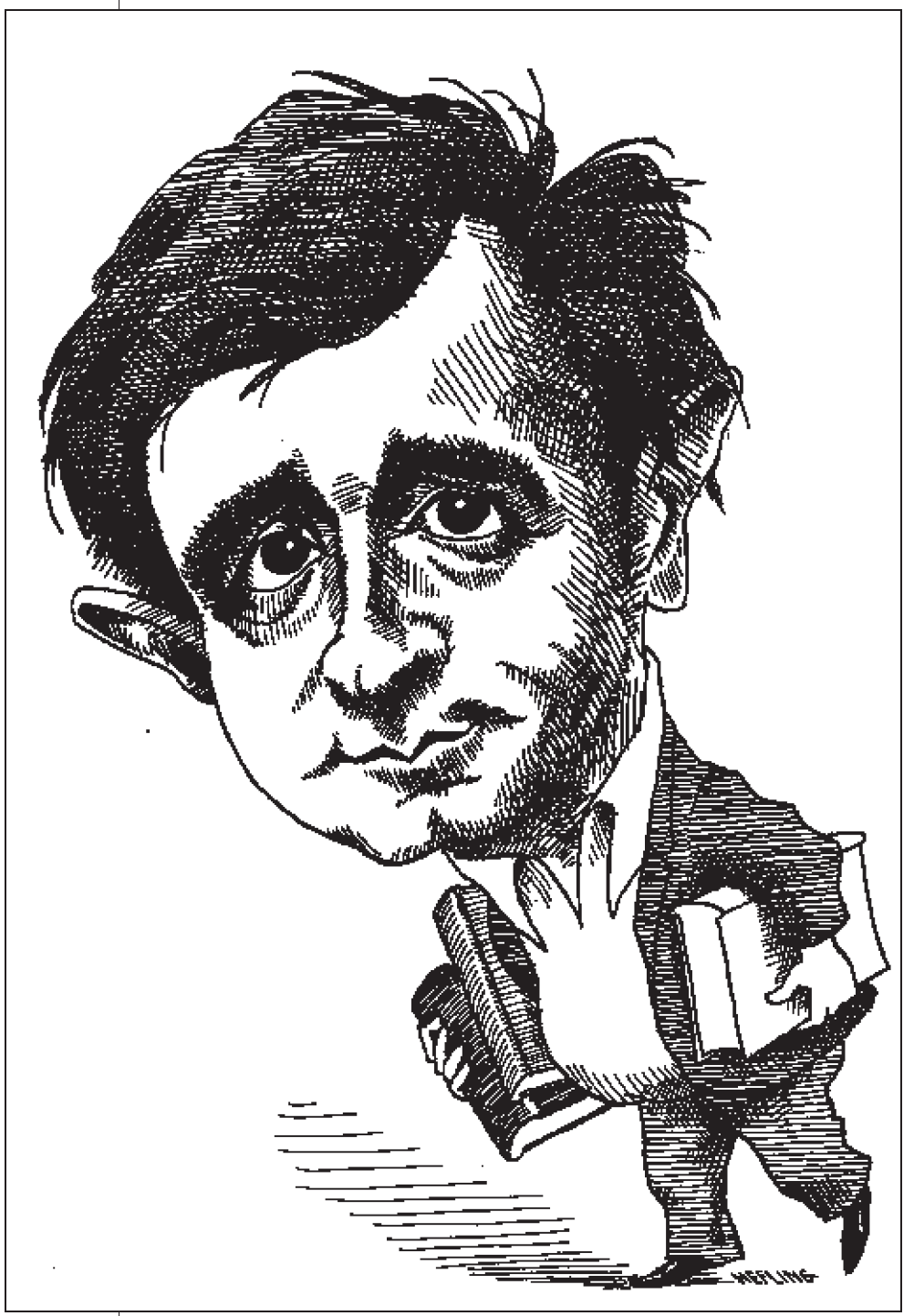 Edmund White is the award-winning author of more than a dozen books, including the autobiographical trilogy A Boy’s Own Story, The Beautiful Room is Empty, and The Farewell Symphony, as well as The Joy of Gay Sex (with Charles Silverstein), States of Desire, Genet: A Biography, Proust, The Married Man, and, most recently, Flâneur: A Stroll through the Paradoxes of Paris. His new novel, Fanny: A Fiction, will be published in the fall of 2003. White is director of creative writing at Princeton University and lives in New York City. He delivered a lecture on the historical novel as part of the Department Of English’s Esther Freier Endowed Lecture Series at the Twin Cities campus of the University of Minnesota in November 2002 and was kind enough during his visit to give me an interview, from which the following conversation—about the body, aging, and beauty—is excerpted.
Edmund White is the award-winning author of more than a dozen books, including the autobiographical trilogy A Boy’s Own Story, The Beautiful Room is Empty, and The Farewell Symphony, as well as The Joy of Gay Sex (with Charles Silverstein), States of Desire, Genet: A Biography, Proust, The Married Man, and, most recently, Flâneur: A Stroll through the Paradoxes of Paris. His new novel, Fanny: A Fiction, will be published in the fall of 2003. White is director of creative writing at Princeton University and lives in New York City. He delivered a lecture on the historical novel as part of the Department Of English’s Esther Freier Endowed Lecture Series at the Twin Cities campus of the University of Minnesota in November 2002 and was kind enough during his visit to give me an interview, from which the following conversation—about the body, aging, and beauty—is excerpted.
—Chris Freeman
Chris Freeman: Let’s talk for a bit about aging. In Christopher Isherwood’s wonderful novel A Single Man, the protagonist, George, is 58. I wonder whether that novel seems different to you now that you’re sort of George’s age than it did when you were reading it back when it first came out and you were around thirty.
Edmund White: Gay men get used to the idea of being old very quickly …
CF: We get old so young!
EW: That’s it. I mean, I think after thirty, you really are considered old by most of the people you want to go to bed with. I remember Virgil Thompson, the composer, once said to me, “Get used to the idea of being old because you’ll spend more than half your life being that in the eyes of most people.” So, I think I did get used to it very early on. On the other hand, I think I was very young-looking myself until I was about fifty and then—boom!—I suddenly looked my age. I mean, I sort of let myself go and I didn’t care much, but also partly I think I let myself go when Hubert [Sorin, White’s lover, who died of AIDS-related complications in 1996] died. But, the truth is, you can go on having a sex life. In fact, I go to bed with boys now who are cuter than the ones I could have had when I was thirty, but I think it’s on different terms now. For instance, I never go to a bar because there’s nothing there for me. Even boys who like older men would never be seen cruising an older man in front of their friends . . .
CF: Or they would not be seen leaving a bar with one.
EW: That would be a disgrace. So, you have to meet them in a way that their friends don’t know about.
CF: How?
EW: I’ve met guys through the Internet, though even there the question of age comes up right away. But there is someone who resembles Michelangelo’s David whom I met on line at four AM on a rainy Tuesday in February—and I’ve been seeing him occasionally ever since. I’ve also been known to meet people who’ve written me fan letters; Michael Carroll, my lover for the last eight years, wrote me a wonderful long letter when I was still in Paris and he was living in the Czech Republic. Of course, the baths is the most honest place to meet someone strictly for sex. Everyone comes wrapped in a towel, nothing more, and there are no lengthy introductions.
CF: A scene in A Single Man has George looking at his reflection and seeing all of his selves—the younger man and the older. He’s sort of trying to recognize himself in his older body or the different parts of his life.
EW: Yeah, definitely. I’m always shocked when I see photos of my younger self because it’s not the way I think of myself. I think of myself as younger and slimmer and cuter. It’s a strange kind of double vision, I suppose. Another thing that happens when you’re my age is you think, “At the most I have twenty more years to live and probably only fifteen more years to work, and how many books can I write in that period?” And I think of how quickly the last fifteen years went by, so it seems to me really like being on a rapid slide. Everybody my age talks about how to avoid the horror of senility and a painful or disgraceful decline. I don’t think there is a way, unless you commit suicide at just the right moment.
CF: Or you get taken in some accident or some other type of thing.
EW: You can long for that.
CF: Interesting. It must be strange for you, because of the last fifteen years of your life, now to be fifteen years later talking about having fifteen more years to live.
EW: Well yes, there’s that, too. I mean, I was diagnosed HIV positive in 1985, so I certainly thought “This is it.”
CF: How do you—how does anyone—get over the obsession with an HIV-positive body as an infected body? How do you get past that?
EW: I suppose you must begin by liking the body of someone else who has AIDS. I wrote a little piece called The Photo. What happened was that Rollie McKenna, a friend of the poet James Merrill, was living down in Key West. One day we were over at her house—she was very, very old—and she took a picture of Hubert, who was quite ill. And I love this photo. It’s right before he died, so he was hollow-faced and somehow scorched. I mean, his skin was so dark by that point. Anyway, Hubert’s brother—who’s a big, handsome, gay weightlifter—saw it and said, “Why on earth do you have that photo on your mantle?” And then I thought about it, and I wrote this piece, and it was all about how anybody can be banally handsome, and that Hubert had been very beautiful and very handsome, but so what?
There was this other kind of beauty that he had earned and won through the disease, that the disease had given him, and this was a superior form of beauty. Some of that, of course, was whistling in the dark, but it was also my determination not to succumb to the world’s æsthetic. So much is coded, so much judgment and distaste is coded into all those words about health and sickness.
CF: Let’s talk a bit more about one of our mutual favorite topics, beauty. You’ve written about beauty and about taste or your own taste in men or boys. There’s been a lot of conversation in the gay community about the sculpted bodies and the Tom Bianchi versions of beauty, which Tom Bianchi doesn’t really even buy into, as his essays make clear, perhaps most notably in 1995’s In Defense of Beauty. He’s written eloquently about other kinds of beauty, not just muscle boys.
EW: He never shows it, though.
CF: Maybe not. So, what is beauty to you?
EW: My definition of beauty is extremely wide. The people who think I’m a “looksist” are always shocked when I point out somebody on the street and say, “Oh, isn’t he beautiful?” And they’ll say, “That guy?” I mean, the truth is, I guess there’s a constant interplay between my ideas of physical beauty and my ideas of what’s attractive on a moral level and even just the simple level of animal energy. So, I’m really open to almost anybody and consider most people good looking.
Jean Genet, in an essay about the artist Giacommeti, wrote about the wound and how we all have a wound. For me, the sensual part of beauty is the wound. If I look at a pornographic film, let’s say, and I can’t see any flaws—any kind of squirming nervousness in the eyes or any kind of anxiety about keeping an erection or any anxiety or uncertainty at all—then that person isn’t beautiful to me. I mean, right now I’m writing about the photographer Greg Gorman’s nudes, and I find it very hard to do because the people are too perfect. They look to me like androids rather than real people. So, I talk about that in my essay. The wound or the flaw is an important ingredient in beauty. It goes back to Rappaccini’s Daughter and The Birthmark of Nathaniel Hawthorne. I think my main feeling in love and in sex is gratitude. I always feel very grateful to this person. I see other people as semi-divine beings who confer favors on me.
CF: Lucky you.
EW: Yeah, lucky me. I have been very, very lucky that way because, I mean, I wouldn’t go to bed with me, but other people do. So, that’s very nice.
CF: Is beauty dangerous? Let’s talk about the person who has beauty.
EW: I’ve lived with a lot of famous beauties, and I know how fragile it is. It’s something that they’re never quite sure they have. But, on the other hand, they don’t want to go out the door without spending two hours making sure it’s there. It’s not hypocritical; it’s uncertainty about exactly what “it” is. They know that it has a date on it—that it’s not going to go on forever.
CF: Right. An expiration date.
EW: Yes, a short shelf life. I oftentimes try to think, would I like this person so much if he weren’t beautiful, and would I attribute to him all these wonderful qualities? What if he were sitting here, 85 years old and bald and covered with sores, would I think what he’s saying is so intelligent and so endearing? But I guess I have almost a Platonic feeling that physical beauty is a sort of access to wisdom and goodness—that there is somehow a link.
I think we live in a very odd society where all advertising, movies, television, everything is geared to physical beauty and worships it slavishly. And yet, if you were to interview almost any American, he or she would probably rank physical beauty very low on his or her list of important values. People think it’s superficial to talk about beauty the way I am talking about it now. I can hardly find the terms to do it because they are so unfamiliar. You almost have to go back to Plato to find any vocabulary for discussing beauty. And yet, I’m really only articulating the principles everybody operates under but nobody admits. There’s a discourse around beauty that has become both universal and erased.
CF: I think beauty is dangerous for the people who have it—in part because of the values of our culture—because if they live in that beauty, then they’re considered arrogant, and people hate that and resent them for it. There’s that slogan, “Don’t hate me because I’m beautiful,” which I think L’Oréal or one of the hair-care products uses. I love that line because, what better reason to hate someone or to be hated, right? I think I’ve watched beauty destroy so many people because they don’t own their beauty. They don’t know how to manage it.
EW: I also think that, because we equate youth and beauty, we have a very odd misunderstanding of beauty. For example, Virginia Woolf talks about Mrs. Ramsay’s beauty in To The Lighthouse, and when she enters a room, everybody changes. We’re talking about a 55-year-old woman. I think few American kids, say, reading that book for a college course can even make sense of that, because they can’t imagine somebody their mother’s age being considered beautiful.
CF: I recently taught the movie Antonia’s Line, the wonderful Dutch film, by Marleen Gorris, and my students were stunned to realize that the woman who plays Antonia is beautiful. And they sort of said this before they realized what that meant because she’s this zaftig fifty-something-year-old woman and she’s beautiful—the actress—but that’s part of the reason why this is not an American movie. We spent a lot of time talking about the different ways in which it’s not an American movie. I think the taboos about vanity and arrogance and those kinds of things make beauty almost as much a curse as a gift. I always like to talk to people who are beautiful about their beauty.
EW: Are they comfortable with that?
CF: They’re not at all. They either don’t want to admit that they’re beautiful, or they don’t want to admit what beauty does for them. It’s like an affirmative action thing or something. They don’t want to admit that it was because they were beautiful that a door was opened for them.
EW: And yet, take one form of beauty, height. There was a study I read two or three years ago that men over six feet tall tend to get top positions, move ahead in life faster, and so on. And I think you could probably correlate success with traits like blondness.
CF: There have been a number of studies done about school children and how teachers treat the good-looking ones better than the plain ones.
EW: There was another study I read about showing that a lot of recidivism in prison was due to or at least correlated with people being very badly scarred or hideously ugly. [See Richard L. Kurtzberg, et al., “Plastic Surgery on Offenders,” in Justice and Corrections, Johnson and Savitz, eds., 1978.] This one head of a hospital decided to do plastic surgery on a group of these multiple offenders and then turned them back into the world, and many of them changed their behavior drastically. Most of them didn’t end up going back to prison.
I think it’s such a huge subject, and it’s really only the residue of a hateful Christianity that keeps people from seeing the pagan power and even divinity of beauty. Which isn’t to say that I couldn’t fall in love next with a total dweeb….
Chris Freeman, co-editor of The Isherwood Century, teaches English at St. John’s University in Minnesota. He is currently working on a biography of Paul Monette.





